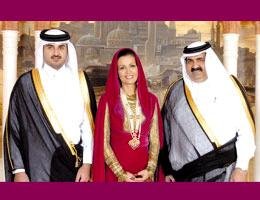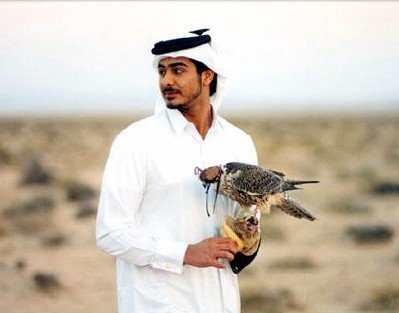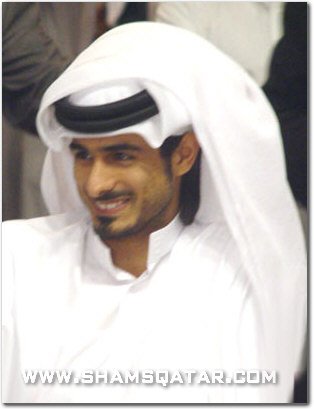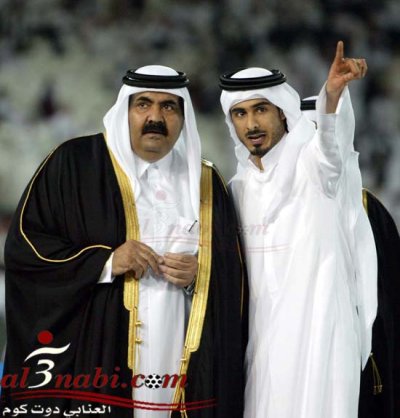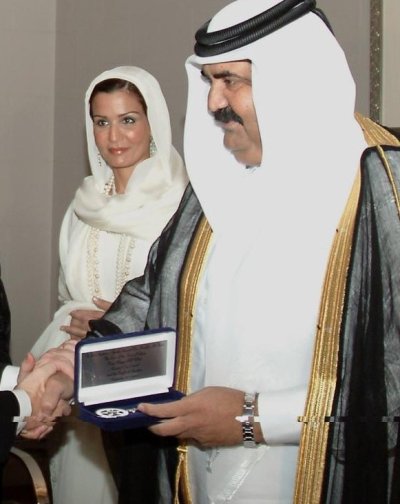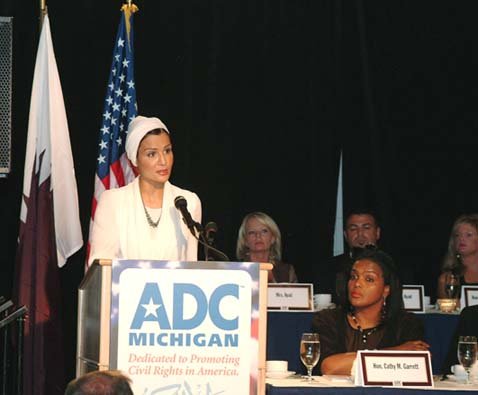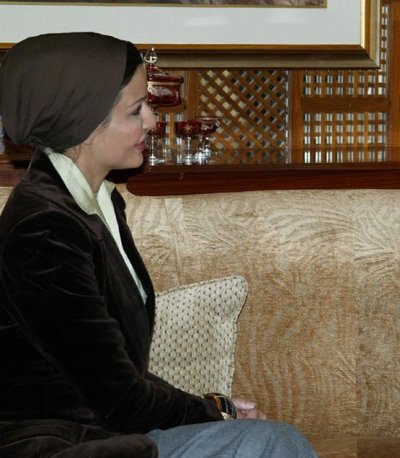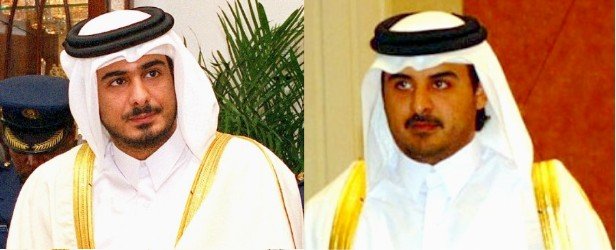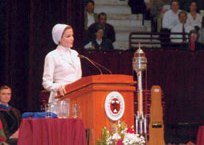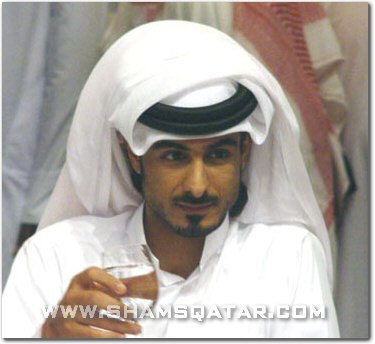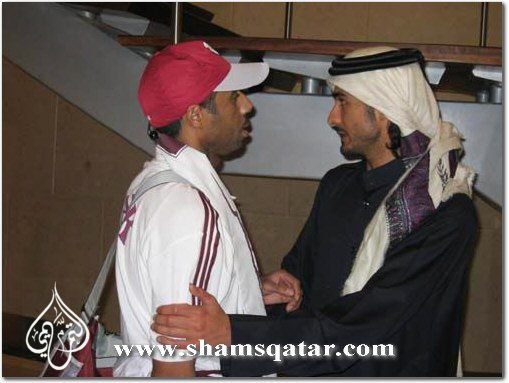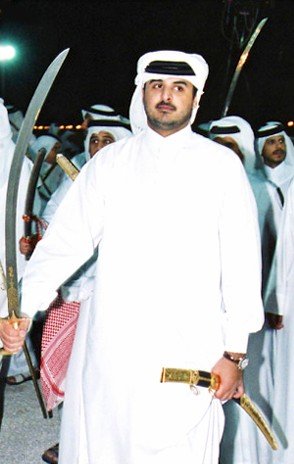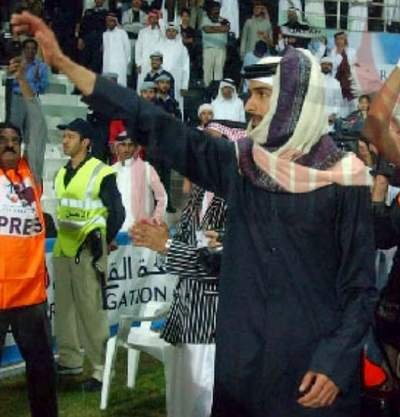here's a woman who we don't here about too often but who has done so much for women in the middle east, particularly in her country of qatar...it's a shame we don't hear more about this woman...she's not young, not hip to the latest fashions, but she's beautiful all the same...
http://www.msnbc.com/news/988109.asp?cp1=1
Hillary Clinton, Stand Back
Qatar’s First Lady leads a modernization effort
By Carla Power
NEWSWEEK INTERNATIONAL
Nov. 10 issue — Texas A&M is coming to Qatar, and the Gulf emirate is welcoming the university with a Texas-size barbecue. Inside an air-conditioned tent in the capital of Doha, local cooks dish up heaps of ribs and fajitas. Cowboy boots have been flown in specially, to serve as table centerpieces. The Aggie Wranglers, an American country-dance group in tight jeans, perform athletic down-home dances for the hundreds of assembled guests, eliciting whoops from the Texan visitors and bemused applause from the Arab hosts. At ceremonies the day before, the Qatari students of the university’s new campus, more than half of them women in black abayas and higabs, belted out the school song, “The Spirit of Aggieville,” accompanied by the university’s marching band arrayed on a Texas football field and beamed in by satellite. Grown Aggies wept when two cherub-cheeked Qatari undergraduates delivered speeches, closing their Arabic address by yelling, “Howdy!”
NEARBY SAT the event’s principal architect, Sheikha Mozah bint Nasser Al Missned, the second wife of the emir, out of three. For the past eight years, she’s worked on creating Qatar’s Education City, which formally opened earlier this month and also includes branches of Cornell Medical School and Virginia Commonwealth University. She decided to fund American universities in Qatar when she noticed that her children, who attended English-speaking primary schools in Doha, were becoming “strangers” to their own Arab, Muslim culture: “One Christmas, my eldest son had to play the Christmas tree,” she told NEWSWEEK. “I felt embarrassed and humiliated.”
Will Tiny Emirates Pave the Way?
Driven, imaginative and rather daring by regional standards, Sheikha Mozah has emerged as an icon of the tiny emirate’s modernization efforts. In a region where First Ladies steer clear of public policy, Sheikha Mozah is head of the Qatar Foundation, which oversees the education and medical care of the state’s 150,000 citizens. Where other Gulf consorts tend to be invisible to the public eye, Sheikha Mozah “came out” for the first time in September, raising Qatari eyebrows by allowing herself to be photographed. Later, discussing the national and international press attention generated by the photo shoot, she came to realize that the publicity might help further her cause: “I thought, ‘They [now] know that for education, we are willing to do everything’.”
At the palace dinner to celebrate Education City’s inauguration, it was not so much the emir as Sheikha Mozha, resplendent in crimson velvet and ruby-and-diamond jewelry, whom the movers and shakers lined up to greet. The union between the gazelle-like Sheikha Mozah and the burly 53-year-old emir is not a traditional Gulf marriage. “He’s a friend, more than a husband,” observes Sheikha Mozha, who married Sheik Hamad bin Khalifa al-Thani as a high-school student, a quarter century ago. Doha court watchers even quip that in the emir and Sheikha Mozha, the Qataris are getting two leaders for the price of one, just like the Americans got with Bill and Hillary Clinton. “With many other Arab First Ladies, [their work] is more about... conferences, seminars and small-scale social projects,” notes Asmaa Bekada, who produces a women’s program on the Arab satellite TV network Al-Jazeera. “Sheikha Mozha’s work is more concrete. You see the results.”
Sheikha Mozha’s high profile fits neatly into a key platform of her husband’s reform plans: women. Extending the vote to women was not simply a progressive reform, notes the Washington Institute for Near East Policy’s Simon Henderson, but a canny extension of his own political base. For Qatar’s women, the change from traditional roles as homemakers to career women has happened in a few years, notes Dr. Ghalia al-Thani, vice chair of Qatar’s National Committee for Human Rights. “I almost worried it was too fast.” She says Sheikha Mozha “has been an absolute inspiration for both men and women to become agents of change.”
In part, it’s because the fortysomething consort has refused to limit her work by gender, as many elite women reformers do in the conservative Gulf region. “I don’t like to frame [the Qatar Foundation’s] issues as women’s issues,” she says, wearing black slacks and pearls, her red-streaked hair uncovered in the privacy of her pale-blond-wood study. “Why are we dividing our country in terms of men and women?” That’s a pertinent question, but a risky one in a region where life is organized around the notion of two communities, divided by gender. Argues Sheikha Mozha: “If you want to solve problems in this region, you have to solve the problems of all Arabs.” Indeed, she thinks the vogue for feminism in Arab countries was “a big mistake,” since it was, like so many “isms” imported from the West, a foreign model blindly applied to Arab culture. The vogue in the 1970s and ’80s for women to abandon their own Arab and Muslim values in favor of miniskirts and an unquestioning embrace of Western trends left many feeling culturally adrift.
Though outspoken and opinionated, Sheikha Mozha delicately sidesteps commenting on American actions in Iraq. “I do not think democracy can be enforced from the outside,” she says diplomatically. Maybe not from outside, but certainly from above. She supports her husband’s decision to grant elections and a constitution to his politically quiescent nation. The emir, she says, “is clever enough to anticipate the needs of his people.” His most famous reform—the establishment of the groundbreaking Al-Jazeera network—is proof. “Arab leaders always say, ’[Democracy] should come gradually’,” she notes. “But Al-Jazeera opened our eyes. Our people are ready for democracy. Listen to their comments, their arguments, their debates on Al-Jazeera! Who can judge they are not ready?” After an hour with Sheikha Mozha, even the staunchest dictator might start seeing things her way.
i think what she's done is actually working, not something glamorous, not something that's been photographed a thousand times and seems to shout "LOOK AT ME! LOOK AT HOW GOOD I AM!"...but something real that actually benefits people...
also, i have to admire her and her husband's willingness to support Al-Jazeera...unlike other middle eastern countries which greatly limit the press, qatar has allowed Al-Jazeera unprecendented freedoms...
http://www.msnbc.com/news/988109.asp?cp1=1
Hillary Clinton, Stand Back
Qatar’s First Lady leads a modernization effort
By Carla Power
NEWSWEEK INTERNATIONAL
Nov. 10 issue — Texas A&M is coming to Qatar, and the Gulf emirate is welcoming the university with a Texas-size barbecue. Inside an air-conditioned tent in the capital of Doha, local cooks dish up heaps of ribs and fajitas. Cowboy boots have been flown in specially, to serve as table centerpieces. The Aggie Wranglers, an American country-dance group in tight jeans, perform athletic down-home dances for the hundreds of assembled guests, eliciting whoops from the Texan visitors and bemused applause from the Arab hosts. At ceremonies the day before, the Qatari students of the university’s new campus, more than half of them women in black abayas and higabs, belted out the school song, “The Spirit of Aggieville,” accompanied by the university’s marching band arrayed on a Texas football field and beamed in by satellite. Grown Aggies wept when two cherub-cheeked Qatari undergraduates delivered speeches, closing their Arabic address by yelling, “Howdy!”
NEARBY SAT the event’s principal architect, Sheikha Mozah bint Nasser Al Missned, the second wife of the emir, out of three. For the past eight years, she’s worked on creating Qatar’s Education City, which formally opened earlier this month and also includes branches of Cornell Medical School and Virginia Commonwealth University. She decided to fund American universities in Qatar when she noticed that her children, who attended English-speaking primary schools in Doha, were becoming “strangers” to their own Arab, Muslim culture: “One Christmas, my eldest son had to play the Christmas tree,” she told NEWSWEEK. “I felt embarrassed and humiliated.”
Will Tiny Emirates Pave the Way?
Driven, imaginative and rather daring by regional standards, Sheikha Mozah has emerged as an icon of the tiny emirate’s modernization efforts. In a region where First Ladies steer clear of public policy, Sheikha Mozah is head of the Qatar Foundation, which oversees the education and medical care of the state’s 150,000 citizens. Where other Gulf consorts tend to be invisible to the public eye, Sheikha Mozah “came out” for the first time in September, raising Qatari eyebrows by allowing herself to be photographed. Later, discussing the national and international press attention generated by the photo shoot, she came to realize that the publicity might help further her cause: “I thought, ‘They [now] know that for education, we are willing to do everything’.”
At the palace dinner to celebrate Education City’s inauguration, it was not so much the emir as Sheikha Mozha, resplendent in crimson velvet and ruby-and-diamond jewelry, whom the movers and shakers lined up to greet. The union between the gazelle-like Sheikha Mozah and the burly 53-year-old emir is not a traditional Gulf marriage. “He’s a friend, more than a husband,” observes Sheikha Mozha, who married Sheik Hamad bin Khalifa al-Thani as a high-school student, a quarter century ago. Doha court watchers even quip that in the emir and Sheikha Mozha, the Qataris are getting two leaders for the price of one, just like the Americans got with Bill and Hillary Clinton. “With many other Arab First Ladies, [their work] is more about... conferences, seminars and small-scale social projects,” notes Asmaa Bekada, who produces a women’s program on the Arab satellite TV network Al-Jazeera. “Sheikha Mozha’s work is more concrete. You see the results.”
Sheikha Mozha’s high profile fits neatly into a key platform of her husband’s reform plans: women. Extending the vote to women was not simply a progressive reform, notes the Washington Institute for Near East Policy’s Simon Henderson, but a canny extension of his own political base. For Qatar’s women, the change from traditional roles as homemakers to career women has happened in a few years, notes Dr. Ghalia al-Thani, vice chair of Qatar’s National Committee for Human Rights. “I almost worried it was too fast.” She says Sheikha Mozha “has been an absolute inspiration for both men and women to become agents of change.”
In part, it’s because the fortysomething consort has refused to limit her work by gender, as many elite women reformers do in the conservative Gulf region. “I don’t like to frame [the Qatar Foundation’s] issues as women’s issues,” she says, wearing black slacks and pearls, her red-streaked hair uncovered in the privacy of her pale-blond-wood study. “Why are we dividing our country in terms of men and women?” That’s a pertinent question, but a risky one in a region where life is organized around the notion of two communities, divided by gender. Argues Sheikha Mozha: “If you want to solve problems in this region, you have to solve the problems of all Arabs.” Indeed, she thinks the vogue for feminism in Arab countries was “a big mistake,” since it was, like so many “isms” imported from the West, a foreign model blindly applied to Arab culture. The vogue in the 1970s and ’80s for women to abandon their own Arab and Muslim values in favor of miniskirts and an unquestioning embrace of Western trends left many feeling culturally adrift.
Though outspoken and opinionated, Sheikha Mozha delicately sidesteps commenting on American actions in Iraq. “I do not think democracy can be enforced from the outside,” she says diplomatically. Maybe not from outside, but certainly from above. She supports her husband’s decision to grant elections and a constitution to his politically quiescent nation. The emir, she says, “is clever enough to anticipate the needs of his people.” His most famous reform—the establishment of the groundbreaking Al-Jazeera network—is proof. “Arab leaders always say, ’[Democracy] should come gradually’,” she notes. “But Al-Jazeera opened our eyes. Our people are ready for democracy. Listen to their comments, their arguments, their debates on Al-Jazeera! Who can judge they are not ready?” After an hour with Sheikha Mozha, even the staunchest dictator might start seeing things her way.
i think what she's done is actually working, not something glamorous, not something that's been photographed a thousand times and seems to shout "LOOK AT ME! LOOK AT HOW GOOD I AM!"...but something real that actually benefits people...
also, i have to admire her and her husband's willingness to support Al-Jazeera...unlike other middle eastern countries which greatly limit the press, qatar has allowed Al-Jazeera unprecendented freedoms...
Last edited by a moderator:


 why we have not seen her pictures before?
why we have not seen her pictures before?